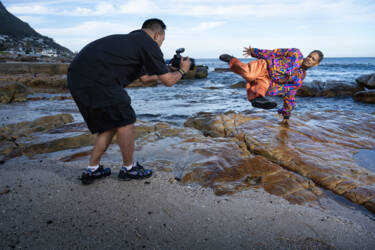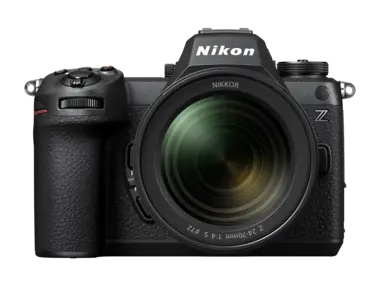How to photograph breaking with the Nikon Z6III

Connecting with your dancers, low angles and high shutter speeds will take your dance photography to new heights, says sports and action photographer Little Shao
“I’ve always had a feeling that by becoming a photographer I could help to show how skilled and creative dancers are,” says Little Shao. The Nikon Ambassador and dancer – who has worked with a variety of brands and sports clubs, from Red Bull to PSG Football club – aims to make the sport of his subject, whether breaking (formerly known as breakdancing) or freerunning, look effortless. “The physical conditions of the body are pushed to the limits,” he adds. “That’s why breaking is now recognised as an international sport.”
This time, he’s swapped his Paris home for Cape Town, tasked with the prompt ‘/Capture: everyday athletes, unexpected performances’, for the second edition of The Human Prompt, a Nikon limited series. Sitting down with Nikon magazine, Little Shao provides his top tips for levelling up your dance photography.

Little Shao

©Jarno Schurgers
Know the codes of breaking
“Photographing breaking is like photographing an artform within a culture with its own codes,” Little Shao explains. “The most important rules are to dig into this environment. Learn the vocabulary, the names of the moves and the correct execution, discover the hand signs that have meaning and learn how to capture the dancer’s freezes (when the body is halted in motion, often balancing). Afterwards, the goal is to try catch these moves and body gestures.”
Aim for a creative atmosphere
Twist the usual activities of your athletes to elevate your images. “The prompt ‘/Capture: everyday athletes, unexpected performances’, acted as a nice reflection on how to become more creative when photographing athletes and their lifestyle,” Little Shao says. “For me, it was about bringing the athletes out of their comfort zone into a creative location or situation.”

Nikon Z6III + NIKKOR Z 14-24mm f/2.8 S, 14mm, 1/2500 sec, f/5.6, ISO 320 ©Little Shao
Focus on framing
Framing is crucial. In the photograph above, Little Shao framed the dancer to be positioned exactly between the sky and sea. “Timing wise, my main goal was to capture the waves coming from behind him – so the dancer had to move just as the water hit the rock but also avoid the spray of the water,” he says. “We both had to work fast, especially as it was slippery for him.”
Experiment with flash
To reduce the shade on the dancer’s face caused by the sun, and to capture more of the colourful sky, Little Shao used a Profoto B10 flashlight to make the face pop and the sky less dark. “Rather than being in burst mode, when using flash you’ve got one click each time, but it worked well,” he says. “I think this also shows the responsiveness of the camera to capture the moment at the right time.”
Angle yourself low
“As breaking is aerial and the dancers are very low on the floor, it’s always better to have your camera close to the floor to give height to the dancers and match their low position,” the Ambassador adds. “Make them look like they’re flying.”
In the second photograph (below) in response to the prompt, Little Shao headed to a skateboard park. “Here, my camera was on the floor, the screen tilted. My skateboarder was coming from the right side,” he explains. Selecting 3D Tracking mode with subject detection, Little Shao clicked the shutter button when his talent passed into the frame. “I was almost taking the photos blind – just feeling the subject come through,” he adds. “I learned the capabilities of the Nikon Z6III creating this image, and seeing how well it catches the subject in random movement.”
Top tip: Experiment with different lenses for varying results. In this image, Little Shao used the NIKKOR AF-S Fisheye 8-15mm f/3.5-4.5E ED with the Mount Adapter FTZ II.

Nikon Z6III + NIKKOR AF-S Fisheye 8-15mm f/3.5-4.5E ED, 14mm, 1/1600 sec, f/4.5, ISO 200, ©Little Shao
Set your shutter speed above 1/1000 secs and use 3D Tracking
To freeze the action and have a subject sharp, increase your shutter speed to above 1/1000 secs, advises Little Shao. “For the aperture – depending on what you want to deliver – photographing close to a subject with a prime lens, aperture wide open, could be tricky since the dancers are moving constantly so you might have a hard time having the dancers in focus,” he explains. For his photograph of the dancer in Cape Town, Little Shao used f/5.6 to have a wide depth of field: “With f/5.6 and 3D Tracking priority, the camera focused not only on the dancer’s legs, but his face. It is so sharp, which is important.”
Connect with the dancers
When you’re entering any new industry, it’s hard to jump into it and create at your maximum potential if you are unknown in the environment. “Be as respectful as you can,” Little Shao explains. “Connect with your dancers, do your research before you meet them by scrolling on their social media or the internet. Make sure you share the images with them during your photoshoot, asking them which they prefer. They will be more involved and will improve their moves or stances for you to capture a better photo.”
Know when to save the energy of the dancers
Don’t exhaust your dancers by asking them to perform nonstop. Instead, direct them and ask for their best form and signature moves. “Try to save their energy and gain their trust to make sure they see that you know what you are doing,” Little Shao adds.

©Jarno Schurgers
The Nikon Z6III in review
What was your first impression of the Z6III?
“When I’m filming and photographing, my camera becomes an extension of my hand. The Z6III fits great and there’s no change to what you see in real life and in the camera. It’s a lot more responsive and faster than the Z6II and the EVF is so much brighter. Quality wise, the colours, the dynamic range, everything in this camera is a little brother to the Z8.”
How was the slow motion video?
“I tried the 240fps slow motion in full HD. It’s twice fps with what we had before, and it’s taken slow motion to a whole new level. For content creators having these possibilities to increase frame per second is great. I’ve been waiting for this for a long time.”
What lenses did you use?
“The NIKKOR Z 14-24mm f/2.8 S, NIKKOR Z 135mm f/1.8 S Plena and NIKKOR AF-S Fisheye 8-15mm f/3.5-4.5E ED with a Mount Adapter FTZ II.”
How did the camera perform in low light?
“I photograph constantly in dark environments – concerts and dance competitions – so autofocus in low light is crucial. I wanted to challenge the camera body as much as possible, so I told my dancer we were going to go to where there’s almost no light at all. He was jumping in the air and it was focusing perfectly.”
Who do you recommend this camera for?
“If you want to jump in and push your work to another level without missing out on quality or technology, this is the camera. It’s good from everything from street photography to portraits, action and sport. A lot of my Instagram followers I know want to capture the most stunning action shots. This camera is going to help produce even more creative images.”
Discover the Nikon Z6III
Featured products
More featuring Little Shao
Why bokeh isn’t just for background (plus camera settings to try with the NIKKOR Z 135mm f/1.8 S Plena)
How do you capture the everyday athlete with the Nikon Z6III?

Unlock greater creativity












